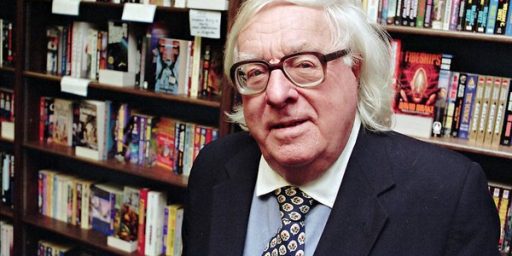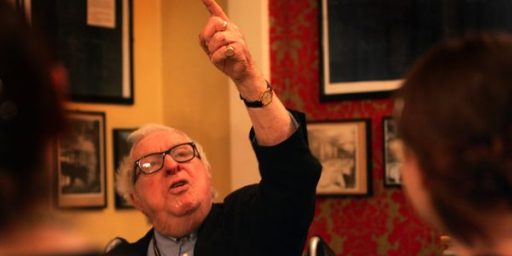FAHRENHEIT 451 AT 50
John Miller interviews Ray Bradbury on the 50th Anniversary of the publication of his anti-censorship masterwork.
Amid this prodigious output, “Fahrenheit 451” is the book for which Mr. Bradbury will be best remembered. Perhaps that’s because the concept is so unforgettable: In the near future, firemen don’t put out fires; they start them instead. Books have been outlawed. When they’re discovered, first responders hurry to the scene. The title refers to the temperature at which paper burns.
One of the paradoxes of science fiction–and a fact poorly understood by many people who don’t read it–is that much of the genre displays deep doubts about the future. Some of the finest books in the field, from Mary Shelley’s “Frankenstein” to Aldous Huxley’s “Brave New World” to William Gibson’s “Neuromancer,” regard technology as dangerous and dehumanizing.
Bradbury eschews the title of science fiction writer, insisting he writes “fantasy.”
Mr. Bradbury insists that the purpose of “Fahrenheit 451” was not to prophesy. “I wasn’t trying to predict the future,” he says. “I was trying to prevent it.”
In one immediate sense, he failed. In 1979, he discovered that “some cubby-hole editors” had bowdlerized his book in 98 places. One line–“Feel like I’ve a hangover. God, I’m hungry”–became “Feel like I’ve a headache. I’m hungry.” The changes first appeared in a 1967 edition for high-school students, but it wasn’t until Mr. Bradbury learned of the problem a dozen years later and complained that his publisher saw the irony of censoring a powerful anticensorship novel. “I will not go gently onto a shelf, degutted, to become a non-book,” he wrote of the incident.
Heh.
Today, Mr. Bradbury is more concerned with another problem that he thinks he didn’t prevent. “There’s no reason to burn books if you don’t read them,” he says. “The education system in this country is just terrible, and we’re not doing anything about it.”
One of the often-overlooked details of “Fahrenheit 451” is that the censorship Mr. Bradbury describes was not imposed from the top by a ruthless government. Rather, it seeped up from the indifferent masses. As a villain explains: “School is shortened, discipline relaxed, philosophies, histories, languages dropped, English and spelling gradually neglected, finally almost completely ignored. . . . No wonder books stopped selling.”
While I find the point overstated–I now make a living in the book publishing industry, after all–there is some measure of truth here as well.





Power-hungry Politicians have rushed in to fill the vacuum created by the inertia of the masses. Laziness of the most vile kind has permitted this to happen.
—